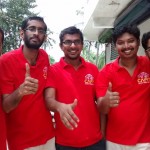Vivek Kumar founded Qlicket in late 2011 along with his cofounder Deependra Tewari. They’ve created a WiFi management solution that allows anyone to create an out of home WiFi hotspot, and also allows B2B customers to enhance their brand to customers like never before. Deependra and Vivek went deep into product development and factored in multiple hardware and software aspects to improve the entire experience, from client marketing, to network management, to TRAI authentication across different devices.
Vivek was in San Francisco, California before moving to India, working at a start-up that was eventually acquired by Boingo, one of the world’s largest public WiFi operators. Vivek’s job was to monetize hotspots in the U.S., where he learnt about the opportunity to provide people with ad-supported WiFi, Qlicket’s initial business model. When he came to India on vacation, he found that only 10% of the population had Internet access. Months later he decided to move to India to see how he could help increase the penetration rate.
The initial revenue model was an ad-supported model where Qlicket would work with Internet Services Providers (ISPs) to monetize public WiFi hotspots. It was something like watch an engaging ad for 30 seconds for 30 minutes of free WiFi.
Even though the model sounded great, he had difficulties in selling it because the market was not big enough – both from a supply and demand perspective. WiFi hotspots were still not popular enough and digital online ad spend still hadn’t picked up in India. He quotes the fact that although this is Facebook’s second largest market in terms of number of users, only a very tiny percentage of revenue for Facebook actually comes from India. Moreover, those hotspots that did exist often failed to work reliably, further adding to the difficulties of trying to execute an engaging ad campaign over them. He finally realized he had had enough when the ISPs started demanding lots of money from him through higher and higher minimum monthly guarantees, despite the fact that he was already paying them revenue shares every month.
Vivek had two options – Die (return the money to his investors) or Develop a Parallel Model (create a better WiFi solution that’s easy to manage, irrespective of the ISP or telecom provider). He chose the latter, and together with Deependra, they have been developing better patent-pending WiFi management hardware and software. Unlike in the US, where anyone can set up a WiFi hotspot, people in India can’t set one up unless they have systems that allow for proper authentication. Moreover, the Qlicket WiFi system provides information on things such as frequency of visits by users, engagement levels with house and third-party advertisements on the login page, and at an aggregate level, which are the most visited websites at an establishment.
After developing this device, they pivoted from the ad-supported model to setting up hotspots for restaurants and hotels on a software as a service (SaaS) based model. Their pricing may at times be 2x-3x higher than the average price establishments pay for Internet plans at certain locations, but they are often not even the most expensive solution on the market. Many people advised them that no customer in India will pay for their product, but they soon found a market for their solution because they were finally making something people felt they needed, even if they didn’t always enjoy having to pay for it. Since they look at what customers want as a critical part of their solution and they provide that, they boast of a 100% customer retention rate and more and more monthly usage by users and establishments.
Vivek’s advice to startup founders is the YCombinator motto of “Make something people want.” He tried a different model with ads, but ISPs did not care about creating a good user experience. Instead, ISPs only wanted money (through minimum monthly guarantees), and so he figured that this was not the way to go, and he pivoted. He also says that he should have pivoted earlier, as the market was telling him something else, even if research indicated otherwise — though it did take time to identify all the problems with WiFi in India and build a better hardware and software product from scratch. The growth for Qlicket was based on traction of customers signing up and constantly asking for more and more features after logging in everyday and seeing value through the system.
If the market is telling you something, do not spend forever trying to convince others of your belief. Change the model, be it pricing, product, customers, distribution channels, etc. Keep experimenting until you find something that works and you achieve that product/market fit. Once you do, put in all your energy and efforts into that thing you find working for you and it will grow.
Qlicket, (http://www.qlicket.com) is a 15-member team, serving 20 customers in 30 locations across India. They have been featured in The Economic Times as one of the 15 hottest startups for 2015. In 2014, they were one of five finalists for The Wharton India Economic Forum Startup Competition and were one of the six startups selected to present at India Internet Day. Techcircle has featured them as one of India’s ten most promising tech startups and the U.S. Embassy in New Delhi mentioned Vivek and Qlicket during a speech on “The Next Great Entrepreneur.”






